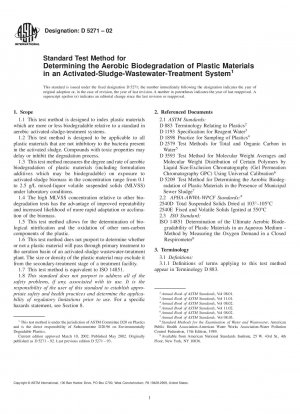ASTM D5271-02
Standard Test Method for Determining the Aerobic Biodegradation of Plastic Materials in an Activated-Sludge-Wastewater-Treatment System
- Standard No.
- ASTM D5271-02
- Release Date
- 2002
- Published By
- American Society for Testing and Materials (ASTM)
- Status
- 2011-01
- Latest
- ASTM D5271-02
- Scope
The degree and rate of aerobic biodegradability of a plastic material in the environment determines to what extent and in what time period that plastic may be eliminated from certain environments. With increasing use of plastics, disposal is becoming a major issue. This procedure estimates the degree and time required to biodegrade plastics in an activated-sludge-wastewater-treatment aeration basin. This test method determines the degree of aerobic biodegradation by measuring the consumption of oxygen due to respiration of the microbial population, as a function of time when the plastic is exposed to an inoculum of activated sewer sludge in the concentration range from 30 mg/L to 1000 mg/L MLVSS. This test method is designed to measure the oxidation of plastics containing carbon, hydrogen, oxygen, nitrogen, phosphorus, sulfur, chlorine, and sodium. Changes in the molecular weight and physical characteristics of the polymer after exposure to activated-sludge inoculum can be assessed by other ASTM test methods, such as Test Method D 5209
. Activated sludge from a sewage treatment plant that treats principally municipal waste is considered to be an acceptable active aerobic inoculum available over a wide geographical area in which to test a broad range of plastic materials. When biodegradation in a specific activated-sludge-wastewater-treatment system is to be determined seed should be collected from that environment. Alternatively, soil or compost suspensions, or both can be used for inoculation, because with some plastic materials the activity of fungi is important for biodegradation.
1.1 This test method is designed to index plastic materials which are more or less biodegradable relative to a standard in aerobic activated-sludge-treatment systems.
1.2 This test method is designed to be applicable to all plastic materials that are not inhibitory to the bacteria present in the activated sludge. Compounds with toxic properties may delay or inhibit the degradation process.
1.3 This test method measures the degree and rate of aerobic biodegradation of plastic materials (including formulation additives which may be biodegradable) on exposure to activated-sludge biomass in the concentration range from 0.1 to 2.5 g/L mixed-liquor volatile suspended solids (MLVSS) under laboratory conditions.
1.4 The high MLVSS concentration relative to other biodegradation tests has the advantage of improved repeatability and increased likelihood of more rapid adaptation or acclimation of the biomass.
1.5 This test method allows for the determination of biological nitrification and the oxidation of other non-carbon components of the plastic.
1.6 This test method does not purport to determine whether or not a plastic material will pass through primary treatment to the aeration basin of an activated-sludge wastewater-treatment plant. The size or density of the plastic material may exclude it from the secondary-treatment stage of a treatment facility.
1.7 This test method is equivalent to ISO 14851.
1.8 This standard does not purport to address all of the safety problems, if any, associated with its use. It is the responsibility of the user of this standard to establish appropriate safety and health practices and determine the applicability of regulatory limitations prior to use. For a specific hazards statement, see Section 8.
ASTM D5271-02 Referenced Document
- ASTM D1193 Standard Specification for Reagent Water
- ASTM D1898
- ASTM D2579 Standard Test Method for Total Organic Carbon in Water
- ASTM D3593 Test Method for Molecular Weight Averages and Molecular Weight Distribution of Certain Polymers by Liquid Size-Exclusion Chromatography (Gel Permeation Chromatography GPC) Using Universal Calibration
- ASTM D5209 Standard Test Method for Determining the Aerobic Biodegradation of Plastic Materials in the Presence of Municipal Sewage Sludge
- ASTM D883 Standard Terminology Relating to Plastics
- ISO 14851 Determination of the ultimate aerobic biodegradability of plastic materials in an aqueous medium — Method by measuring the oxygen demand in a closed respirometer
ASTM D5271-02 history
- 2002 ASTM D5271-02 Standard Test Method for Determining the Aerobic Biodegradation of Plastic Materials in an Activated-Sludge-Wastewater-Treatment System
- 1993 ASTM D5271-93 Standard Test Method for Determining the Aerobic Biodegradation of Plastic Materials in an Activated-Sludge-Wastewater-Treatment System
